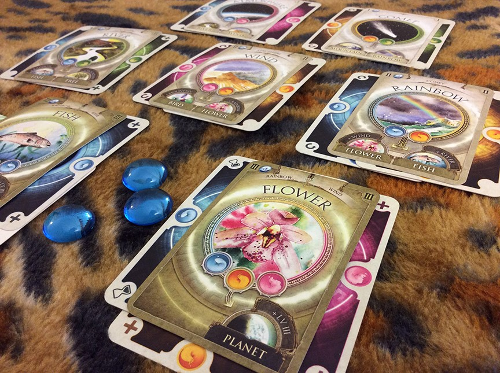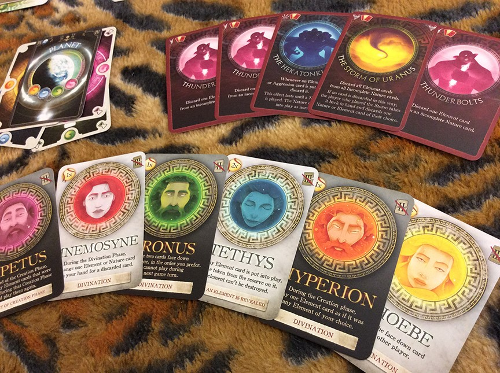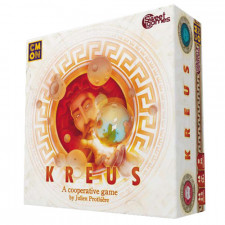Kreus Review
on May 17, 2017
The planet's a crazy place. Inviting-looking hotsprings are teeming with flesh-eating bacteria, slightly misfolded proteins can cause our brains to self-destruct, the cordyceps fungus turns ants into infectious suicide bombers, and the entire ecosphere is getting less habitable by the minute. In the immortal words of critic Jay Sherman, "It stinks." Surely you could do it better?

Kreus' tiny creation is one of gaming's more beautiful flowcharts.
That's the challenge set by Kreus, the cooperative card game from French designer Julien Prothiére. In this game for 3-6 players, players embody Titans of Greek mythology, collectively constructing a new planet in an act of rebellion against their father, Uranus. They'll begin with the most basic aspects of Nature, such as Atmosphere, and use them to create more complex substances like Rainbow, Mountain, Tree, and eventually Planet. Each Nature card unlocks several more, but only after it's been completed by combining the correct Element cards.
When I first saw Kreus, I was instantly reminded of the early iOS and Flash hit, Doodle God. Like that game, there's a bit of humor and a bit of poetry in the way the Nature and Element cards fit together. For example, Comet, the primordial source of matter and energy (composed of the Elements Fire and Earth), paves the way for both Mountain and Rainbow, but both Rainbow and River are necessary to create Fish.
There's a big difference, however, in game feel. Doodle God was a breezy time-waster that might eventually stump but could always be cleared by combining elements randomly. Kreus is a tight exercise in efficient sequencing with limited communication, much like the Spiel des Jahres winner Hanabi. The entire deck gets distributed to the players at the start of the game, so finding the right cards is never an issue, but knowing what to play when can be a challenge. The cards to be played each round are chosen secretly in what's called the Divination phase, then they're revealed and played (or not) in the Creation phase. Trying to play an Element card when there's no need for it or a Nature card before its prerequisites are met means the card is discarded with no effect, and the game is tight enough that this is to be avoided at all costs.
Further complicating things are Aggressions from the Titans' siblings, the Cyclopes and the Hekatonkheires. These cards must be played, and they can't be played on the first or the last round of the game. The most common card, Thunderbolts, destroys an Element from a partially-completed Nature card, so with proper timing its effects can be mitigated. The worst card, the Storm of Uranus, can't be played for no effect, but its impact can still be minimised.

The Titan cards help the players in Incarnation mode, while the Aggression cards work against the forces of creation.
As in Hanabi or Mysterium, however, communication between players is strictly limited. In the strictest variant, the game is played in total silence. The only way to share information is to spend Energy tokens, a very limited resource that can be replenished by successfully playing Nature cards (good) or discarding cards (not recommended). Expend one Energy and you can show one card to one player; expend two and you can exchange cards with another player, though you must each choose what you're giving before you know what you're getting. Three energy tokens can undo the disaster of misplaying a critical Nature card by allowing you to swap a discarded card into your hand.
Also as in Hanabi or Mysterium, this secret language is the heart of the game, and until enough cross-pollination occurs in conventions and online forums, it will develop differently for each group. So far, I've established the basic convention of showing players which card I've got lined up so they know what not to do, but more advanced players might flash someone a peek as means of requesting a specific play. For example, the Storm of Uranus, as I mentioned, is devastating, but its effect can be avoided entirely if it's played while the Hekatonkheires is active, so the players with those specific cards might want to broadcast their hands. Exchanging cards provides another means of requesting plays, but it can also be used to shift Nature cards from hand to hand to ensure they're played in the right sequence—especially critical with the final Planet card, which has to be played while there are still enough Elements left to complete it.
The fewer players you have, the tighter Kreus gets, to the point that the 3-player game requires perfect coordination to win with only 3 Energy tokens in existence and one fewer set of Elements. After my first game, I tried to play Kreus 3-handed, and even with perfect information, I still lost. Players who want to punish themselves further can try the two optional variants. In the Incarnation mode, each player takes the role of a specific Titan with a special power...but male Titans can't play Level II Nature cards, and female Titans can't play Level III. In the Altered Elements mode, Element cards have additional negative effects or requirements when played.
Because it's more about communication than the actual cardplay, Kreus is best played at the higher player counts, to the point that I wouldn't recommend it at 3, where the artificial tightness actually detracts from player enjoyment. With a full table of Titans, though, it's a weird, peaceful, and beautiful little myth.

 Customer Support
Customer Support  Subscribe
Subscribe 




 Account
Account  Wishlist
Wishlist 

